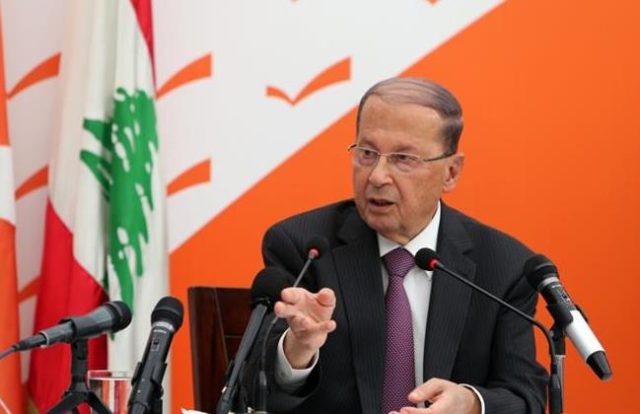As a coalition of disparate forces – including the Iraqi military, Iranian-supported Iraqi Shiite militias, Kurdish forces, Turks, and Iranian militias – closes in on Mosul, Iraq, ready to oust ISIS from the capital of its self-proclaimed caliphate, it is easy to overlook events hundreds of miles away in Beirut. But events in both places are related.
At only half the size of Israel and with half the population, it is easy to overlook Lebanon altogether. Once a sophisticated, cosmopolitan, and diverse country – Beirut was called the Paris of the Middle East – it broke down into its constituent parts decades ago and now lives in sulky (if no longer generally violent) enclaves. Christians are separated into Protestant, Orthodox, and Catholic; Muslims into Sunni and Shiite; and the Druze are a separate entity. In theory, the president, chosen by Parliament, is always a Maronite Christian, the prime minister a Sunni Muslim, and the speaker of the Parliament a Shiite Muslim. In practice, Hezb’allah owns the south (including approximately 130,000 rockets and missiles aimed at Israel) and now, apparently, the government in Beirut.
After 45 rounds of balloting beginning after the election of 2014, the Lebanese Parliament has chosen retired Maronite General Michel Aoun as president. An enemy of Syria during the Lebanese civil war, in 2005, he made peace with Assad in Damascus and then forged an alliance with Hezb’allah at home. His ascension to the post – over Maronite Suleiman Franjieh, favored by Saudi Arabia – puts a point on Iran’s influence in Lebanon, and Iran cheered. Ali Akbar Velayati, Ayatollah Khamenei’s top foreign policy adviser, said, “The election of Michel Aoun as president shows new support for the Islamic resistance [against Israel].”
Perhaps, but it was at least as much a cheer for nailing down the eastern end of the long sought Shiite Crescent and enhancing Iran’s reach across the region.
Iran established Hezb’allah in 1983 as the anchor of the Crescent. It has financed the organization and supplied weapons and training, including those missiles in the South. Iran has taken more and more direct control of Hezb’allah activities and pulled it into the Syrian civil war, where it has taken tremendous casualties and lost some of its luster at home. (Even Shiite Lebanese object to their sons dying in Syria; they prefer the anti-Israel “resistance” meme.) In response to Iranian and Hezb’allah warfare against Sunni Muslims in Syria, as well as Iran’s role in the Houthi uprising in Yemen, the Gulf Cooperation Council and the Arab League, led by Saudi Arabia, labeled Hezb’allah a terror organization and cut off aid to Lebanon in March.
This, as much as anything, may have tipped the scales in favor of Iran’s candidate.
Because everything in the Middle East is connected, the election of Gen. Aoun should be considered in the context of a regional map. Far from the Mediterranean Sea, Iran has long coveted direct – or relatively direct – access. Rather than sailing through the Persian Gulf, the Arabian Sea, the Red Sea, and the Suez Canal to reach the Med, Iran has sought air and land access across Iraq, Syria, and Lebanon: the Shiite Crescent.
Sunni, nationalist, and aggressive, Saddam Hussein was the first impediment to post-revolutionary Iran’s regional ambition. His ouster in 2003 opened the door to Iranian troublemaking in the form of Shiite militias, terrorism, and illegal economic activity. While Iraq was fairly stable with a large American presence by 2007 after the “surge,” after the 2010 election, President Obama supported Iran’s candidate Nouri al-Maliki for prime minister despite fact that Ayad Allawi’s coalition Iraqiya Party had more seats. In 2011, the removal of all U.S. forces – including Air Force assets – increased Iran’s influence.
Without the U.S. Air Force between Iran and Syria, weapons shipments to Damascus by air, which had been difficult to impossible, have flourished, although not on a regular basis. Emanuele Ottolenghi, a senior fellow at the Foundation for Defense of Democracies, keeps track of Iran’s Mahan Air and its stops between Iranian military bases and Syria. Mahan has been under U.S. sanctions since 2011 for “shipping arms to the Syrian government; ferrying members of Iran’s elite military unit, the Islamic Revolutionary Guard Corps; and providing transport for the Lebanese militia Hezbollah,” according to The Wall Street Journal. It hasn’t stopped them.
ISIS, Sunni and radical, is a problem for Iran, so Iranian-sponsored Iraqi militias as well as Iranian-owned Iranian troops have been key to the ground game in Mosul. While the U.S. is flying bombing runs – important, but without an American presence in the Iraqi villages on the ground – Iran is taking full credit with the liberated Iraqis, further cementing its control of Iraqi territory, even in largely Sunni areas. Iranian media is bragging about the role of IRGC Quds Force commander Qassam Soleimani in organizing the battle for Mosul. Soleimani is under both U.S. and U.N. sanctions for exporting terrorism, and Secretary of State Kerry announced that those sanctions “will stay forever.” The general appears not to notice.
Iran also brags about Soleimani’s operations in the battle for Aleppo. Because one of the main reasons for ousting ISIS from Iraq is to clear the path across northern Iraq into northern Syria and defeat the Sunni opposition to Bashar Assad – which will clear the path to Lebanon from the east.
Lebanon is where we started. The U.S. State Department welcomed “Lebanon’s formation of a new government, subject to the confidence of parliament. We have long said that the people of Lebanon deserve a government that responds to their needs and protects their interests.” Perhaps, but this government, run by Hezb’allah, is more likely to respond to the needs and protect the interests of Iran than the people of Lebanon. Iran’s Shiite Crescent has become a reality with an Iranian victory in Lebanon’s election.






